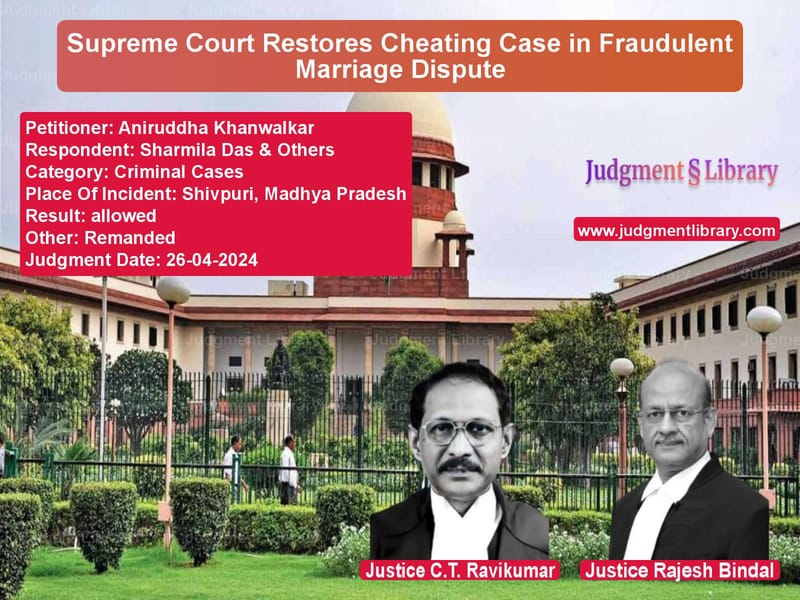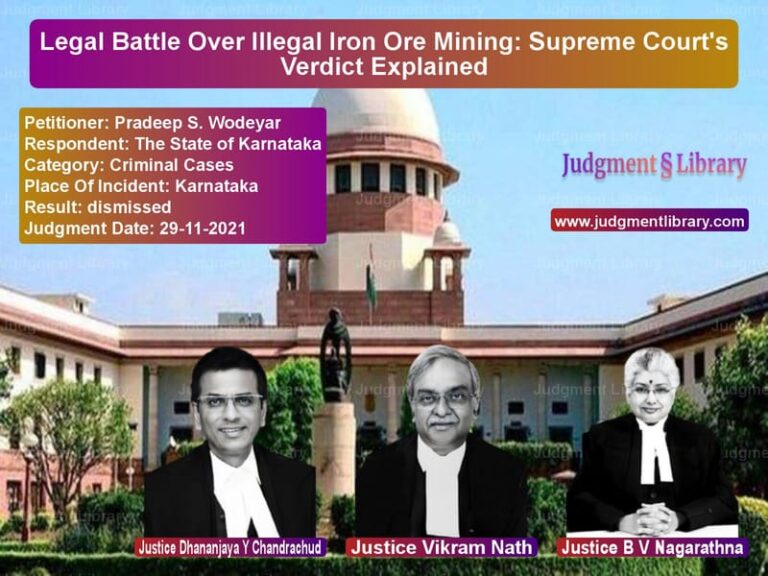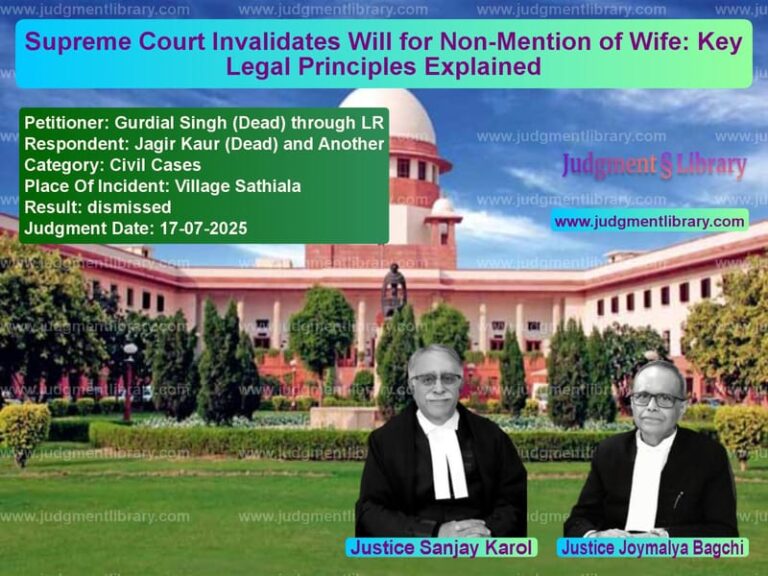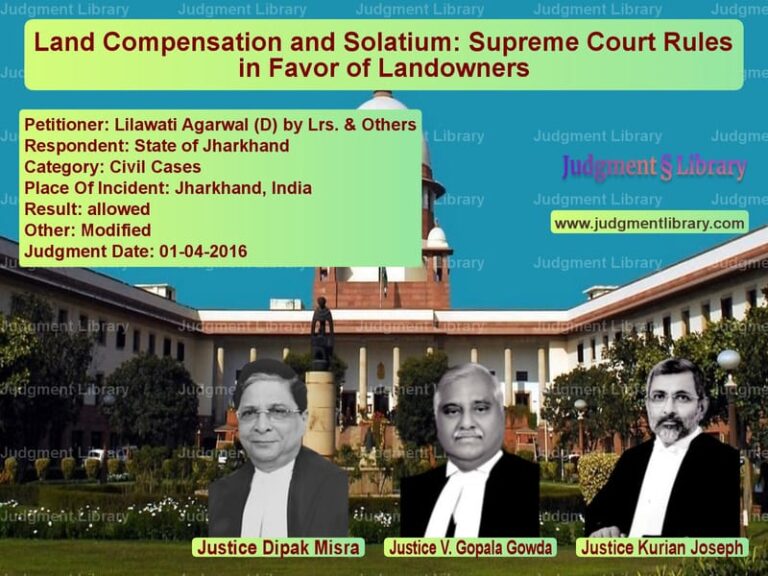Supreme Court Restores Cheating Case in Fraudulent Marriage Dispute
The case of Aniruddha Khanwalkar vs. Sharmila Das & Others revolves around a fraudulent marriage where the appellant discovered that his wife was already married at the time of their wedding. The Supreme Court had to determine whether criminal proceedings under Section 420 (cheating) and Section 120-B (criminal conspiracy) of the IPC should be restored against the accused.
The Court ruled in favor of the appellant, setting aside the decisions of the High Court and Sessions Court and restoring the summoning order passed by the Magistrate, thereby allowing the trial to proceed.
Background of the Case
The appellant, Aniruddha Khanwalkar, married Sharmila Das on April 28, 2018, in the presence of her mother and sister, the other two respondents. They had met through a matrimonial website, where the respondent had declared that she was in the “process of divorce.”
Read also: https://judgmentlibrary.com/supreme-court-restores-criminal-proceedings-in-odisha-land-fraud-case/
Before the marriage, during their meetings in Visakhapatnam, the appellant was shown a blurred copy of a divorce order on a mobile phone. It was stated that the order was pending the judge’s signature and would be provided later. Based on this assurance, the appellant proceeded with the marriage.
After the wedding, the appellant discovered on June 16, 2018, that his wife was pregnant. When he confronted her, she confessed that she had not yet obtained a divorce from her previous husband and that the document shown to him was forged. She expressed her desire to terminate the pregnancy, fearing legal complications.
The appellant, feeling deceived, attempted to resolve the matter but was threatened with false legal cases by the respondents. Left with no alternative, he filed a criminal complaint on July 8, 2018, which led to a legal battle.
Key Legal Issues
- Whether a fraudulent marriage constitutes an offense of cheating under Section 420 of the IPC.
- Whether the involvement of the mother and sister in misrepresenting the divorce status amounts to criminal conspiracy under Section 120-B of the IPC.
- Whether the High Court erred in dismissing the appellant’s case without proper reasoning.
Arguments by the Appellant
The appellant contended:
“I was induced into marriage through false pretenses. The respondents knowingly misrepresented the divorce status and forced me into a fraudulent marriage, causing severe emotional and financial harm.”
He further argued that he had paid Rs. 2 lakh and covered the travel and marriage expenses under false assurances.
Arguments by the Respondents
The respondents countered:
“The appellant was aware that the divorce process was ongoing. No fraudulent intent was involved, and there was no concealment of facts.”
They maintained that there was no deception and that the appellant’s claims were exaggerated.
Supreme Court’s Analysis
1. Establishing Cheating Under Section 420 IPC
The Court examined the elements of cheating and held:
“When a person knowingly misrepresents facts to induce another into a legally significant act, such as marriage, it amounts to cheating.”
Since the appellant was deliberately shown a forged divorce order, the Court ruled that a prima facie case of cheating was made out.
2. Criminal Conspiracy Under Section 120-B IPC
The Court assessed the role of the mother and sister in orchestrating the deception:
“The fact that the mother and sister corroborated the false claim of divorce and encouraged the marriage indicates their participation in a conspiracy.”
The Court found that they had actively contributed to the misrepresentation.
3. High Court’s Failure to Consider Evidence
The Supreme Court criticized the High Court’s decision:
“The High Court dismissed the case without appreciating the clear evidence of misrepresentation. Such an approach is legally unsustainable.”
The Court emphasized that, at the stage of summoning, a prima facie case is sufficient, and detailed evidence evaluation should be left to the trial.
Final Judgment
The Supreme Court allowed the appeal, ruling:
“The orders of the High Court and Sessions Court are set aside. The summoning order issued by the Magistrate is restored, and the respondents shall face trial under Section 420 and Section 120-B of the IPC.”
The case will now proceed to trial at the Judicial Magistrate, Shivpuri.
Key Takeaways from the Judgment
- Fraudulent misrepresentation in marriage can amount to cheating under Section 420 IPC.
- Family members who aid in deception may be liable for criminal conspiracy under Section 120-B IPC.
- High Courts must assess evidence carefully before dismissing criminal cases.
- A prima facie case at the summoning stage does not require full-fledged proof, only an indication that an offense has been committed.
- Victims of fraudulent marriages have legal recourse under both family and criminal law.
Judgment Date: April 26, 2024
Judges: C.T. Ravikumar, Rajesh Bindal
Petitioner Name: Aniruddha Khanwalkar.Respondent Name: Sharmila Das & Others.Judgment By: Justice C.T. Ravikumar, Justice Rajesh Bindal.Place Of Incident: Shivpuri, Madhya Pradesh.Judgment Date: 26-04-2024.
Don’t miss out on the full details! Download the complete judgment in PDF format below and gain valuable insights instantly!
Download Judgment: aniruddha-khanwalkar-vs-sharmila-das-&-other-supreme-court-of-india-judgment-dated-26-04-2024.pdf
Directly Download Judgment: Directly download this Judgment
See all petitions in Fraud and Forgery
See all petitions in Bail and Anticipatory Bail
See all petitions in Judgment by C.T. Ravikumar
See all petitions in Judgment by Rajesh Bindal
See all petitions in allowed
See all petitions in Remanded
See all petitions in supreme court of India judgments April 2024
See all petitions in 2024 judgments
See all posts in Criminal Cases Category
See all allowed petitions in Criminal Cases Category
See all Dismissed petitions in Criminal Cases Category
See all partially allowed petitions in Criminal Cases Category







